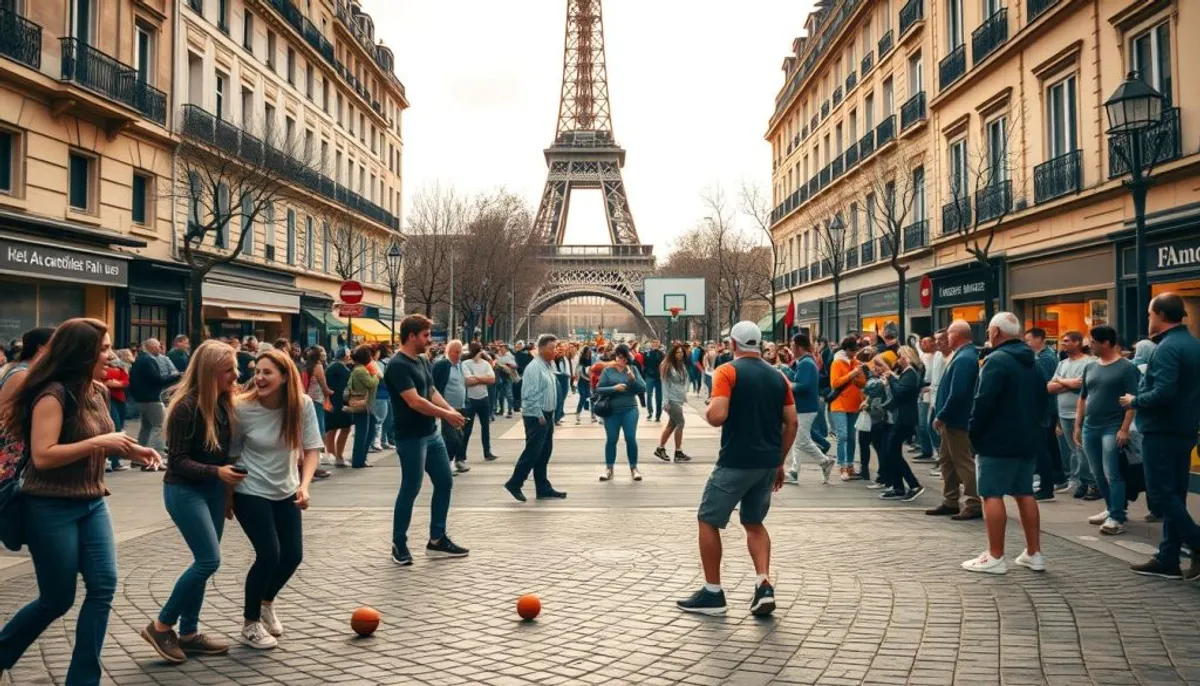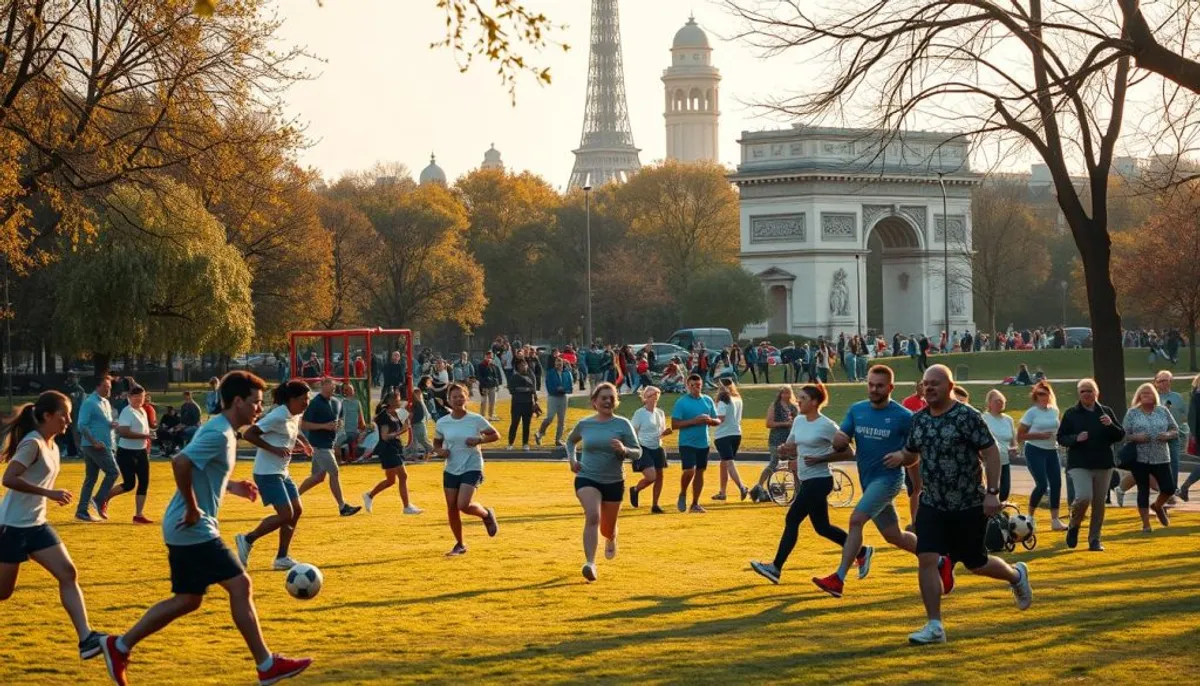Sport plays an essential role in the lives of the French. With 66% of the population engaging in regular physical activities, it is clear that sport is deeply rooted in French culture. This passion is manifested by the existence of 165,919 sports clubs, which welcome more than 15 million licensed members.
The question “does sport belong to French culture” finds its answer in the popular enthusiasm for sporting events. Every weekend, over 1,000 matches take place in France, illustrating the importance of cultural practices related to sport. Figures like Thierry Henry and Yannick Noah have become national icons, embodying sporting and societal values.

Physical activities in France are not limited to football, the national sport. Rugby, handball, tennis, and cycling shape the French sporting landscape. This diversity enriches cultural and sporting practices, making sport a pillar of national identity.
Does sport belong to French culture
Sport occupies a central place in French culture, shaping national identity and influencing societal values. Recent statistics reveal the extent of this integration into our cultural heritage.
Statistics on sports practice in France
In 2023, 70% of French people aged 15 and older report practicing a sport. Among them, 59% engage in sports regularly, at least once a week. These figures testify to the importance of sport in our daily traditions.
| Group | Sports practice | Frequency |
|---|---|---|
| French (15 years and older) | 70% | Report playing sports |
| Regular practitioners | 59% | At least once a week |
The evolution of sports practices in French society
Sports practices have evolved, reflecting changes in our society. Young people aged 15 to 24 are particularly active, with 61% practicing a weekly sport. Sport contributes to personal development and social integration, reinforcing its role in our cultural heritage.
The impact of sporting events on national identity
Major sporting events play a crucial role in the construction of national identity. 80% of the sporting population follows sports news on television, creating moments of collective sharing. These gatherings around sport strengthen the sense of belonging and common societal values.
Sport has thus become deeply embedded in French culture, becoming a vector for expressing our national identity and our traditions. Its influence extends beyond mere practice, shaping our social interactions and our relationship with cultural heritage.
The different sports cultures in France
France is a mosaic of sports cultures, reflecting historical influences and the role of sport in society. These varied practices, including baking craftsmanship, respond to the needs and aspirations of the French. They shape their relationship with the body and health.
The “nature pleasure” sport and outdoor activities
The enthusiasm for outdoor activities is growing. 55% of the French practice sport for their health. Hiking, cycling, or climbing allows them to reconnect with nature while staying active.

The “slow” sport and well-being
Yoga, meditation, or tai chi are gaining popularity. These gentle practices respond to a need for disconnection and mindfulness in a hyperconnected world. They fit into a holistic approach to health.
Team sports and supporter culture
Football remains king in France. Major sporting events like the World Cup create national fervor. Supporter culture plays an important social role, strengthening community ties.
The culture of performance and self-surpassing
Ultra-trail or triathlon attract those who seek to surpass themselves. This culture of performance influences other areas of society, valuing effort and perseverance. However, 42% of the French report never playing sports, highlighting the challenges of accessibility and motivation.
Sport as a social and cultural vector
Sport occupies a central place in French society, influencing cultural practices and societal values. Its historical evolution illustrates its growing role in social life, particularly through the use of culture kadéos vouchers.
The influence of social background on sports practices
Sports practices in France are marked by the influence of social background. Crédoc reports that 87% of senior executives practice a sport annually, compared to 57% of manual workers. The level of education is also crucial: 86% of individuals with a master's degree or higher practice a sport, while 47% of non-graduates do.
| Category | Sports practice |
|---|---|
| Senior executives | 87% |
| Manual workers | 57% |
| Master's degree or higher | 86% |
| Non-graduates | 47% |
The role of sport in personal development
Sport plays a major role in personal development. Historically, it was linked to military ideals but has transformed into a means of individual fulfillment. Values such as strength, agility, finesse, and speed have evolved, reflecting societal changes.

Access inequalities in sports practices
Sport, although it has gained popularity, remains discriminatory. Access barriers are influenced by economic, geographical, and cultural factors. However, its importance in social life is recognized, as shown by a 2012 report adopted by 85 votes out of 88, highlighting its educational and social role.
New trends in sport within French culture
The French sporting landscape is rapidly evolving, reflecting societal and technological changes. Traditional physical activities are giving way to new practices influenced by global trends and digital innovations, illustrating the relationship between culture and progress.
The rise of individual and autonomous practices
The French increasingly favor solo physical activities. According to the latest statistics, 56% of athletes opt for autonomous practices such as walking, cycling, or swimming. This trend is explained by a desire for flexibility and independence in managing time and effort.
The impact of digital technology on sports practices
Digital technology is revolutionizing the world of sport. Fitness apps, online communities, and virtual competitions are transforming how the French train. This digitalization allows for personalized performance tracking and creates new forms of interaction among athletes, despite distance.
Sport as a lifestyle
Today, sport transcends the realm of simple physical activity to become a true lifestyle. Athleisure, a mix of sportswear and ready-to-wear, is gaining popularity. Sports brands collaborate with fashion designers, blurring the lines between performance and style. This fusion influences not only how people dress but also their dietary habits and lifestyle choices.
These new trends are part of a broader evolution of French sporting culture. They reflect historical influences while integrating contemporary innovations, thus redefining the place of sport in society. Major sporting events, such as the 2024 Olympic Games in Paris, promise to accelerate these transformations, reinforcing the central role of sport in French culture.
Conclusion
Sport has become deeply embedded in French cultural heritage. Over the decades, it has shaped our traditions and strengthened our national identity. The figures speak for themselves: the place of sport in the media has exploded, rising from 0.6% in 1883 to 5.4% in 1914 in daily newspapers.
This evolution reflects the growing importance of sport in our society. It is no longer limited to a simple physical activity but has become a true cultural phenomenon. The Olympic Games, for example, unite the nation around common values, recalling the ancient tradition of the Olympic truce.
Sport also plays a crucial role in personal and social development. Studies show its positive impact on the mental health of young people and its power of inclusion. It contributes to education, gender equality, and the construction of a more resilient society, thus aligning with the UN's sustainable development goals.
In the future, the challenge will be to preserve the essence of sport as a unifying element of our culture while adapting it to new practices and technologies. Sport will undoubtedly remain a mirror of our society, reflecting our values and collective aspirations.
RelatedRelated articles


